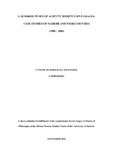| dc.description.abstract | The purpose of this study was to examine the changing self-image of Gikuyu women from 1900 - 2000. This was done through the investigation of three generations of women’s social gender roles across their lifetime, their perspectives of physical image, beauty and style and their hopes and aspirations for today’s generation of women. Case studies were conducted in Nairobi and Nyeri counties where three different tools were used to collect the data. thirty (30) oral testimonies from key informants were recorded; one hundred and twenty (120) face-to-face questionnaires were also conducted in order to provide empirical data that confirmed or disproved what emerged from the oral testimonies. Finally, six (6) focus group discussions were carried out to primarily address collective images of women and to provide further insight on questions that emerged from both the oral testimonies and the face-to-face questionnaires. The Oral testimonies and focus group discussions were examined using a thematic analysis and the face-to-face questionnaires was analysed using frequency distributions. African Feminism was the theoretical framework used for this study. African Feminism confronts the gender, race, class, and cultural oppression that African women face. It is also primarily fighting the negative effects of patriarchy and westernization on African women and African culture as a whole. This research confirmed that patriarchy had socialized women to view certain roles as naturally belonging to them. The study revealed that women’s reproductive roles (ie: domestic chores) had remained constant from 1900 to 2000 as had society’s expectation of women to perform these roles but the women themselves were not critical of the roles. All women were over-burned by their reproductive roles and this was further exacerbated because of the new demands of their productive and community roles. From 1900 to 2000, women have also gone from seeing themselves as restricted to the homestead to having the freedom of movement and interaction and taking leadership roles. When it came to beauty, women still saw Mutumia Ngatha (a virtuous woman) as an example of a good woman and inner beauty was still valued more than outer, cosmetic beauty. The women’s perspectives of physical beauty were found to be in conflict with western ideals in the literature reviewed. The women appealed to today’s generation of women to stop dressing indecently, drinking alcohol and having any form of pre-marital sex which was all taboo. Further research needs to be conducted on young Gikuyu women (below forty years) who were not covered by this study. It is also important that this research be duplicated in other communities so that women’s changing perspectives of themselves are documented. | en_US |



